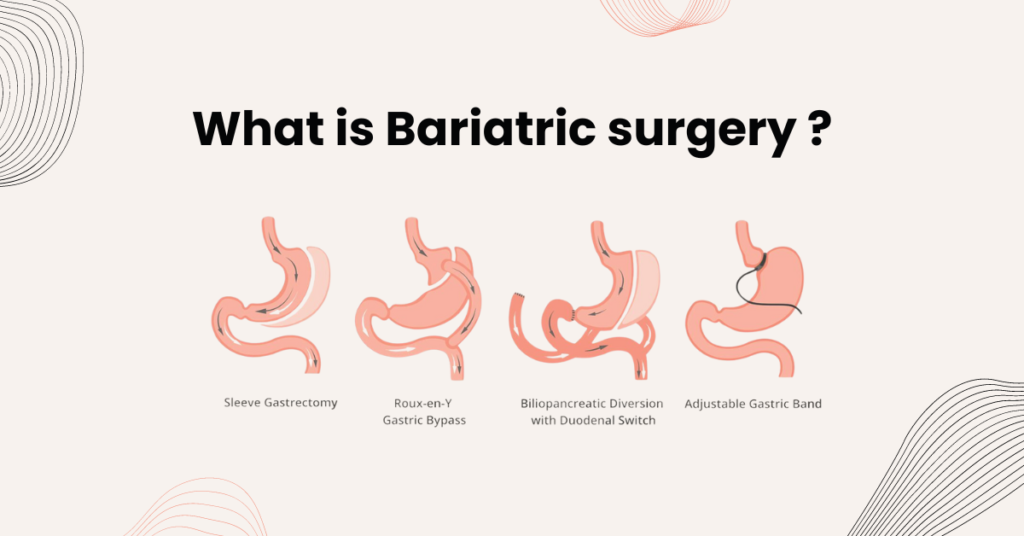
What is Bariatric surgery?
Shedding Pounds, Gaining a Life: A Guide to Bariatric Surgery
Imagine struggling with your weight for years. You’ve tried every diet, exercise plan, and maybe even medication, but the numbers on the scale refuse to budge. This can be incredibly discouraging and leave you feeling hopeless. But there is an option for individuals facing severe obesity: bariatric surgery.
While not a magic solution, bariatric surgery can be a powerful tool for weight loss and improving your overall health. This blog post aims to provide a clear and relatable understanding of bariatric surgery, addressing its purpose, different procedures, and what to expect on the road to a healthier you.
Understanding Obesity: A Battle Beyond Willpower
Often, people struggling with obesity are wrongly perceived as lacking willpower. The reality is far more complex. Obesity is a chronic disease influenced by a combination of genetics, hormones, lifestyle, and environment. It can be incredibly challenging to lose weight solely through diet and exercise, especially when the body is wired to resist weight loss.
Bariatric Surgery: A New Approach
Bariatric surgery, also known as weight-loss surgery, is a surgical procedure that modifies the digestive system to aid in weight loss. It’s crucial to understand that surgery is not a first-line treatment. It’s typically recommended only after conservative methods like diet, exercise, and medication have proven ineffective for individuals with a Body Mass Index (BMI) exceeding 40, or 35 with serious obesity-related health conditions like diabetes or sleep apnea.
How Does Bariatric Surgery Work?
There are different types of bariatric procedures, each with its unique approach:
Restrictive Procedures: These procedures limit the amount of food the stomach can hold, making you feel full sooner and eat less. Examples include Laparoscopic Sleeve Gastrectomy (sleeve surgery) where a portion of the stomach is removed.
Malabsorptive Procedures: These procedures bypass a section of the small intestine, reducing the amount of nutrients your body absorbs from food. One such example is Roux-en-Y gastric bypass, which creates a smaller stomach pouch and diverts food flow.
Biliopancreatic Diversion with Duodenal Switch (BPD-DS): This is a combination of restrictive and malabsorptive procedures, resulting in significant weight loss but requiring close monitoring due to the higher risk of nutritional deficiencies.
Important Considerations Before Surgery
Bariatric surgery is a life-changing decision, and it’s vital to approach it with the right mindset. Here are some essential things to consider:
Pre-Surgery Evaluation: This involves a thorough medical assessment to ensure you’re a suitable candidate for surgery. This may include consultations with various specialists like a nutritionist, psychologist, and surgeon.
Understanding the Risks and Benefits: Bariatric surgery, like any surgery, carries inherent risks like infection, bleeding, and complications. It’s crucial to discuss these potential risks with your doctor and weigh them against the long-term benefits of weight loss and improved health.
Lifestyle Commitment: Surgery is a tool, but lasting success requires a permanent shift in lifestyle habits. Commitment to a healthy diet, regular exercise, and long-term follow-up care is vital for maintaining weight loss and overall well-being.
Living After Bariatric Surgery
Following surgery, you’ll embark on a new journey of adapting to your altered digestive system. This will involve:
Dietary Changes: Initially, you’ll likely consume small, frequent meals. Gradually, you can introduce a wider variety of foods, but portion control and mindful eating become essential.
Nutritional Support: Deficiencies in certain vitamins and minerals are common after surgery. Your doctor will recommend supplements to ensure you get the required nutrients.
Exercise: Regular physical activity is crucial for maintaining weight loss, improving muscle tone, and boosting overall health.
Beyond the Scale: A Brighter Future
Bariatric surgery is not just about shedding pounds; it’s about reclaiming your life. Studies have shown significant improvements in obesity-related conditions like type 2 diabetes, sleep apnea, and high blood pressure. Weight loss can also significantly enhance mobility, reduce joint pain, and improve mental well-being.
Remember: Bariatric surgery is a powerful tool, but it’s not a one-size-fits-all solution. Consulting a qualified healthcare professional is essential to determine if you’re a suitable candidate and to explore the most appropriate procedure for your individual needs.
This blog post aimed to provide a basic understanding of bariatric surgery. It is crucial to remember that this information should not be a substitute for professional medical advice. Always consult with your doctor to discuss your weight loss options and make informed decisions about your health.



